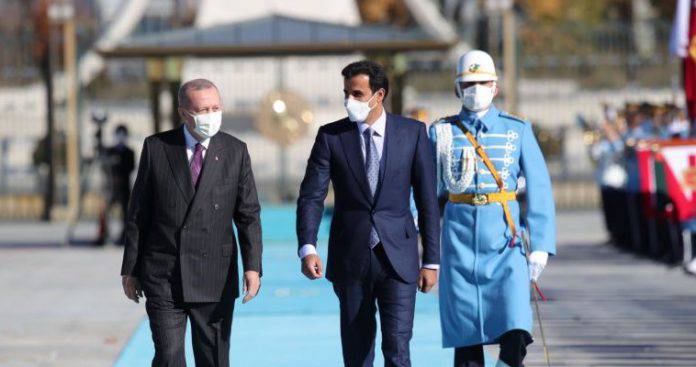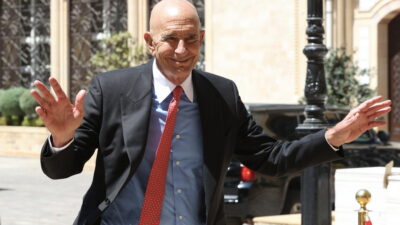Giorgos Protopapas: What’s behind Erdogan’s agreement with Qatar?
28/11/2020
The strategic cooperation between Turkey and Qatar, which extends to the sectors of economy, energy, and investments, is considered a significant support to Tayyip Erdogan, in order for him to face the serious problems of the Turkish economy. This however has caused intense controversy centered on his person. Relations between Ankara and Doha are becoming increasingly closer, as confirmed by the visit to Ankara yesterday of the Emir of Qatar Tamim bin Hamad al Thani, who signed ten investment agreements with Erdogan.
Turkey’s economic co-operation with Qatar reveals the extent to which the government of the Islamist Justice and Development Party (AKP) is relying on its own funds to deal with the economic crisis. Erdogan knows that Qatar is the financial feeder of the Turkish economy and will seek to further strengthen relations with the Gulf state.
The Ankara government is using three strategies to accept aid from wealthy Qatar. The first concerns financial grants from Qatar, some of which are public, while others are secret. These agreements are made under the pretext of Qatar’s contribution to the strengthening of Islamist allies, which serve Erdogan’s neo-Ottoman plans.
The second strategy has to do with cooperation agreements in various fields, investments of companies from Qatar in Turkey, and activation of trade transactions for the export of Turkish products to the Emirate. The third strategy is aimed at defense and security agreements, in which Turkey sends troops to Qatari territory in exchange for money. The Doha government bears the full cost of salaries, transportation, and accommodation.
The agreements signed between Turkey and Qatar amount to $ 300 million. Under the agreements, the Qatari Investment Authority will buy a 10% stake in Istanbul Stock Exchange and Istanbul’s largest shopping center, Istinye Park. Qatar will also invest in the development of the Horn Bay, which includes two luxury marinas, two hotels, a mosque, and a shopping mall.
Qatar is investing billions
Another important investment is the purchase of the commercial port of Antalya. In addition, the Qatari and Turkish Ministries of Commerce are prepared to set up a joint committee to look into the better promotion of the two countries’ products. Turkey-Qatar trade relations are growing rapidly.
The volume of trade between them has tripled in the last five years and in 2019 amounted to more than $ 2 billion. Turkish products rank fourth in imports to Qatar, according to official figures for the first half of 2020. In addition, 280 Qatari companies are active in Turkey, representing the third-largest investor in its construction sector.
Turkey is also one of the favorite tourist destinations of the citizens of Qatar. Qatar’s total investments in Turkey exceed $ 22 billion and are distributed in various sectors, such as tourism, agriculture, energy, defense, banking, and real estate. At the same time, there are more than 500 Turkish companies operating in Qatar and more than 11,000 Turkish citizens living and working in various sectors there.
Common interests
Erdogan’s close relationship with the Emir of Qatar, in addition to the financial transactions of their states, refers to ideologies with the common denominator being the principles of the Muslim Brotherhood. There are some questions about the relationship between the two leaders, which sometimes do not go hand in hand with diplomatic protocols.
Emir Al Thani offered Erdogan his $ 400 million private jet in 2018 and Ankara did not explain why the Emir of Qatar is the head of state to have visited the country mist times in recent years. everyone else in Turkey.
The Muslim Brotherhood factor is considered the paramount link between the leaders of Turkey and Qatar. Relations between the two countries took on a new dimension and were strengthened when the leader of the Muslim Brotherhood, Mohamed Morsi, was first elected to the presidency of Egypt in 2012. The governments of Doha and Ankara had backed the Morsi government in a bid to consolidate its power, but this has not been possible since it was overthrown by a coup by General al-Sisi.
Qatar and Turkey are in the same camp as concerns the conflicts in Libya and Syria. They support the rebels and Islamist extremists fighting against the Damascus regime as well as the government of Tripoli in Libya against General Haftar. The governments of Ankara and Doha seem to maintain a relationship of interaction, based on their common geopolitical interests. Ankara is believed to be redeeming its support for Qatar when the latter was embargoed by Saudi Arabia and other Arab countries.





